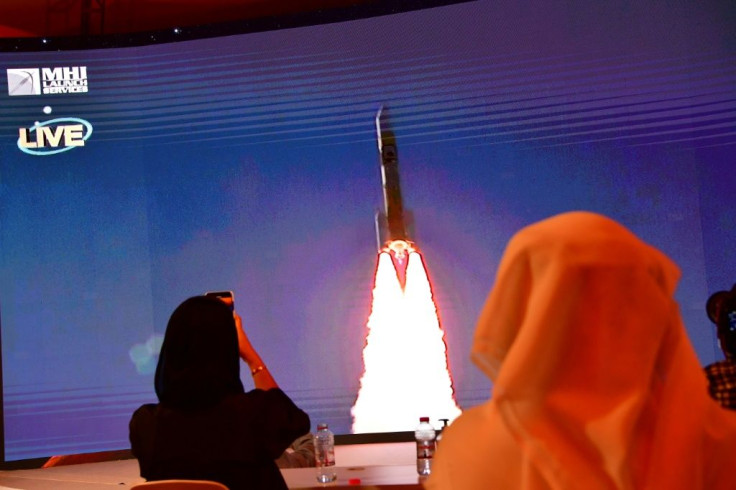UAE Successfully Launches 'Hope,' First Of Three Major Mars Missions This Summer
KEY POINTS
- The UAE successfully launched the 'Hope' probe aboard a Japanese rocket
- It is expected to arrive at the Red Planet in February 2021
- UAE's launch is the first of three Mars missions aiming to launch this summer
The United Arab Emirates (UAE) has successfully launched the first ever Arab mission to another planet after several delays. It is the first of three major Mars missions set to launch this summer.
The Al Amal (Hope) mission was initially scheduled for a July 14 launch but, it experienced several delays due to adverse weather. On Monday, July 20, at 6:58 a.m. local time (5:58 p.m. EDT, Sunday), the Hope probe has finally launched on a Japanese H2-A Rocket from the Tanegashima Space Center in southern Japan to begin its seven-month journey to Mars.
"We have lift-off. H2A, the rocket carrying the Hope Probe to space, has launched from the Tanegashima Space Centre in Japan," the Hope Mars Mission team tweeted, along with footage of the successful launch.
We have lift-off. H2A, the rocket carrying the Hope Probe to space, has launched from the Tanegashima Space Centre in Japan.#HopeMarsMission pic.twitter.com/pRKZLOL7NT
— Hope Mars Mission (@HopeMarsMission) July 19, 2020
It is expected to arrive at the Red Planet in February 2021, in time for the 50th anniversary of the UAE's formation. There, the probe will orbit Mars and take measurements that will add to the current state of knowledge about the planet, particularly regarding its weather and climate.
Apart from its scientific goals, the Hope probe also has several "beyond science" goals, from inspiring young people in the Arab region to take up sciences in school to encouraging global collaboration for Mars exploration.
Further, it is also an attempt from the UAE to move away from dependence on oil and gas and, instead, toward a sustainable, knowledge-based economy.
In a statement, NASA Administrator Jim Bridenstine congratulated the UAE, noting that the mission is "aptly named" because it is an inspiration, not just for the UAE but, also for the region and the world.
"We are in awe of the speed and commitment the UAE, through both the Mohammed bin Rashid Space Center and the UAE Space Agency, has demonstrated in developing its first interplanetary spacecraft," Bridenstine said. "Moreover, your dedication to advancing the world's understanding of Mars by publicly sharing the science and data produced by Hope represents the values of unity, peace, and transparency, that will be so important as humanity moves ever farther into the solar system."
Should the UAE succeed in bringing Hope into Mars's orbit, it will become only the second nation to place a vehicle on the Red Planet on its first attempt.
Just a few days after Hope's successful launch, China is set to closely follow with its own Mars mission, the Tianwen-1, this July, possibly on the 23rd. In fact, the rocket set to launch the rover to Mars is already in position at the Wenchang Space Launch Center in Hainan.
NASA is also aiming to launch the Mars Perseverance rover this summer, no earlier than July 30 at 7:50 a.m. EDT. On July 7, the nose cone containing the rover was already placed atop the United Launch Alliance Atlas V booster, which will launch it off the Earth.
"Even during these challenging times, humanity's spirit of exploration and curiosity remain undeterred," Bridenstine said. "We're eager for our own Mars mission, Perseverance, to join Hope on its journey to explore Mars."

© Copyright IBTimes 2024. All rights reserved.






















